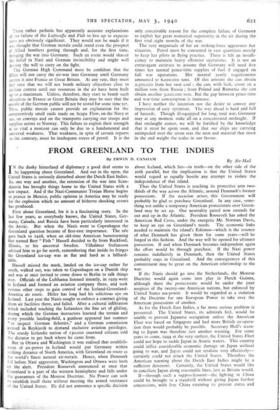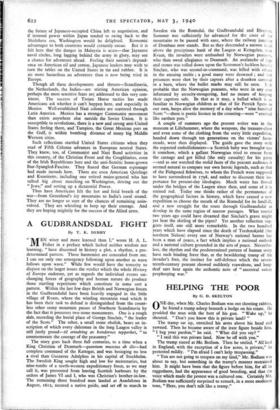FROM GREENLAND TO THE INDIES
By ERWIN D. CANHAM
T N the dusky hinterland of diplomacy a good deal seems to I be happening about Greenland. And out in the open, the United States is seriously disturbed about the Dutch East Indies.
So, one way and another, the extension of the war into Scan- dinavia has brought things home to the United States with a new impact. And if the Nazi-Communist Trojan Horse begins to prance in Mexico, public opinion in America may be ready for the explosion which no amount of hitherto shocking events has produced.
First about Greenland, for it is a fascinating story. In the last few years, as everybody knows, the United States, Ger- many, Canada, and Russia have been particularly interested in the Arctic. But when the Nazis went to Copenhagen the Greenland question became of first-rate importance. The tale goes back to 1928, when an old-time American barnstorming flier named Bert " Fish " Hassell decided to fly from Rockford, Illinois, to his ancestral Sweden. Vilhalmur Stefansson advised him to go far north, remembering that inside its fringes the Greenland ice-cap was as flat and hard as a billiard- table.
Hassell missed the mark, landed on the ice-cap rather far south, walked out, was taken to Copenhagen on a Danish ship and was at once invited to come down to Berlin to talk things over. Officials of the Lufthansa listened intently, in it 929 went to Iceland and formed an aviation company there, and took various other steps to gain control of the Iceland-Greenland- America air route. Hitler has long had his solicitous eye on Iceland. Last year the Nazis sought to enforce a contract giving them air facilities there, and failed. After a cultural infiltration which included teaching the Icelanders the fine art of gliding, during which the German instructors learned the terrain and every possible landing-field, a gunboat appeared last summer "to inspect German fisheries," and a German commission arrived in Reykjavik to demand exclusive aviation privileges. The sturdy kelandic nation of 130,000 unarmed citizens told the dictator to get back where he came from.
But in Ottawa and Washington it was realised that establish- ment of air-power in Iceland would put Germany within striking distance of North America, with Greenland en route as the world's finest natural air-terrain. Hence, when Denmark f AI before Nazi aggression, Washington and Ottawa were both the alert. President Roosevelt announced at once that reenland is a part of the western hemisphere and falls under guarantees of the Monroe Doctrine. No Power can seek ) establish itself there without meeting the armed resistance F the United States. He did not announce a specific decision By Air-Mail about Iceland, which lies—in truth—on the other side of the zoth parallel, but the implication is that the United States would regard as equally hostile any attempt to violate the independence of that island.
Thus the United States is reaching its protective arm two- thirds of the way across the Atlantic, around Denmark's former possessions. If the occasion arises, this Government will probably be glad to purchase Greenland. In any case, some- thing not unlike a temporary American protectorate over Green- land may be set up. Our neutrality patrol now extends far out and up in the Atlantic. President Roosevelt has asked the American Red Cross, under the energetic Mr. Norman Davis, to keep an eye on Greenland's needs. The economic links needed to maintain the island's Eskimos—which is the essence of what Denmark has given them for some years—will be forged in this fashion. And the way will be opened for ultimate possession. If and when Denmark becomes independent again the effort would be through purchase. If the Nazi power remains indefinitely in Denmark, then the United States probably stays in Greenland. And the consequences of this commitment may be great on the American relationship to the war.
If the Nazis should go into the Netherlands, the Monroe Doctrine would again come into play in Dutch Guiana, although there the protectorate would be under the joint auspices of the twenty-one American nations, but enforced by United States sea-power. It would be regarded as a violation of the Doctrine for one European Power to take over the American possessions of another.
As for the Dutch East Indies, a far more serious problem is presented. The United States, its admirals feel, would be unable to prevent Japanese occupation unless the American Fleet was based on Singapore and had more British co-opera- tion than would probably be possible. Secretary Hull's warn- ing to Japan was therefore just another warning. For some years to come, 1944 at the very earliest, the United States Fleet could not hope to tackle Japan in Asiatic waters. This country could inflict considerable economic damage on Japan without going to war, and Japal could not retaliate very effectively— certainly could not attack the United States. Therefore the American warning about the Dutch East Indies might be a sufficient deterrent. Certainly, the United States would like to conciliate Japan along reasonable lines, just as Britain would.
If—through such a rapprochement—the fighting in China could be brought to a standstill without giving Japan further concessions, with free China retaining its present status and the future of Japanese-occupied China left to negotiation, and if internal power within Japan tended to swing back to the Shidehara era, Washington would be delighted. Economic advantages to both countries would certainly ensue. But it is felt here that the danger in Malaysia is acute—that Japanese naval circles, long lagging behind the army in glory, may see a chance for adventure ahead. Feeling their nation's depend- ence on American oil and cotton, Japanese leaders may wish to turn the tables on the United States in tin and rubber. It is no more hazardous an adventure than is now being tried in Europe.
Though all these developments and threats—Scandinavia, the Netherlands, the Indies—are stirring American opinion, perhaps the most sensitive fears are addressed to this very con- tinent. The success of Trojan Horse tactics has made Americans ask whether it can't happen here, and especially in Mexico. Well-established Nazi colonies are scattered through Latin America. Mexico has a stronger Communist movement than exists anywhere else outside the Soviet Union. It is susceptible to revolutions, there is a new and strong anti-United States feeling there, and Tampico, the Great Mexican port on the Gulf, is within bombing distance of many big Middle Western cities.
Such reflections startled United States citizens when they read of Fifth Column advances in European neutral States. They knew, too, of Communist and Nazi Bund activities in this country, of the Christian Front and the Coughlinites, even of the Irish Republicans here and the anti-Semitic home-grown Star-Spangled-Fascists. They feared that German espionage had made inroads here. There are even American Quislings and Kuusinens, including one retired major-general who has talked big about marching on Washington, driving out the "Jews," and setting up a dictatorial Power.
Thus have Americans felt the hot and fetid breath of the war—from Greenland's icy mountains to India's coral strand. They are no longer so sure of the chances of remaining unin- volved. They are whistling to keep up their courage. And they are hoping mightily for the success of the Allied arms.



































 Previous page
Previous page